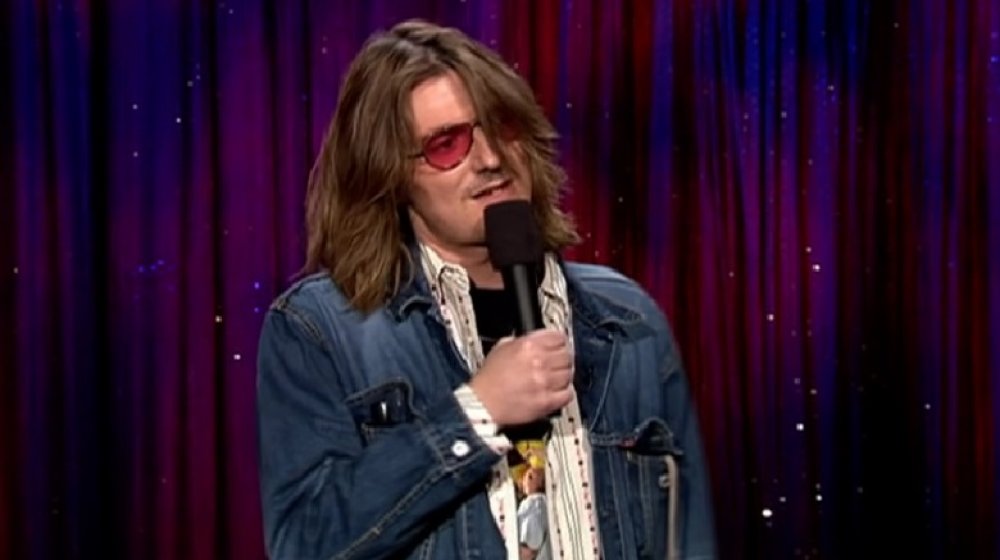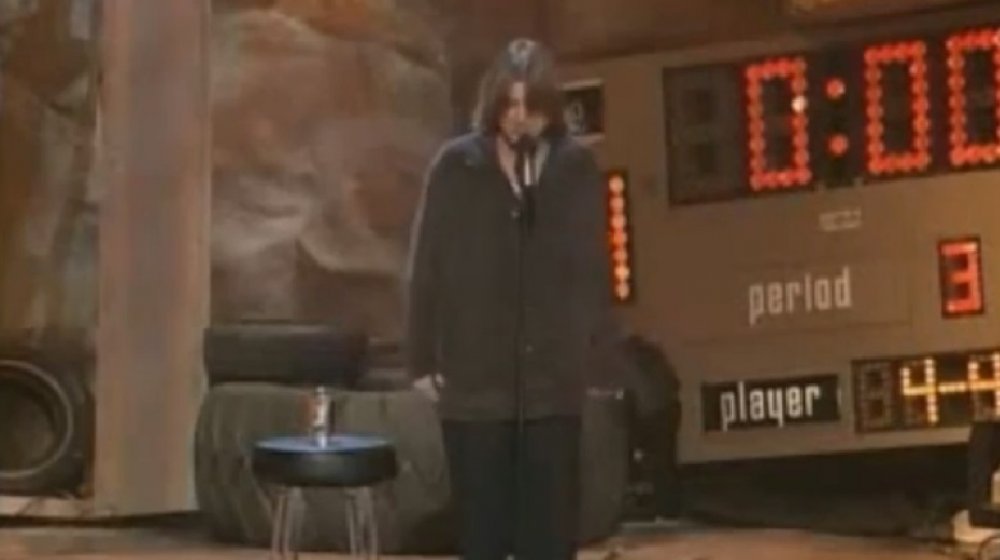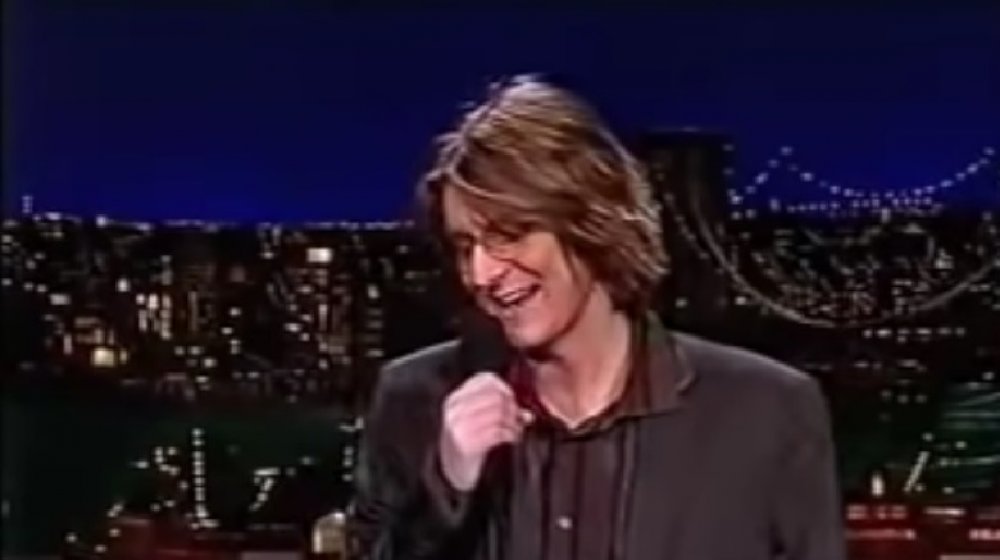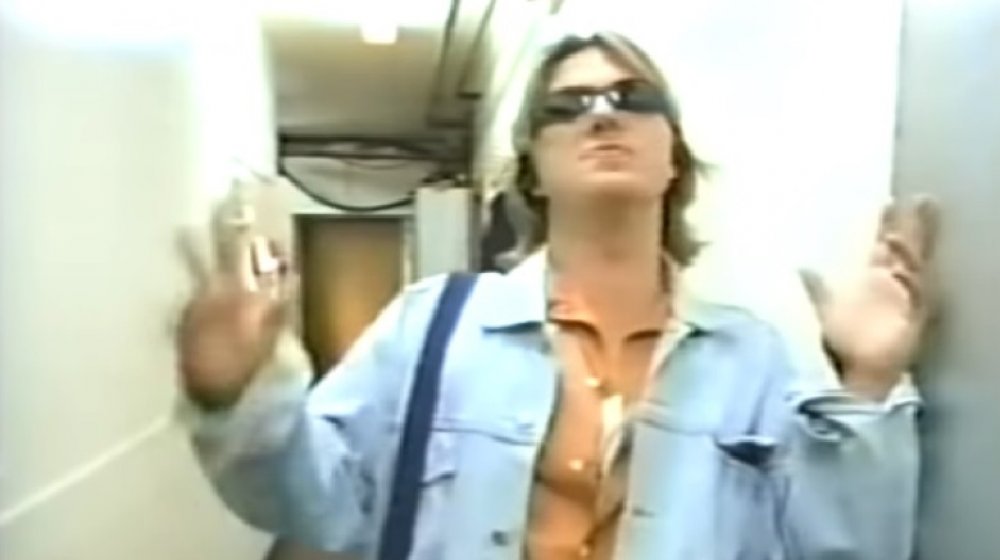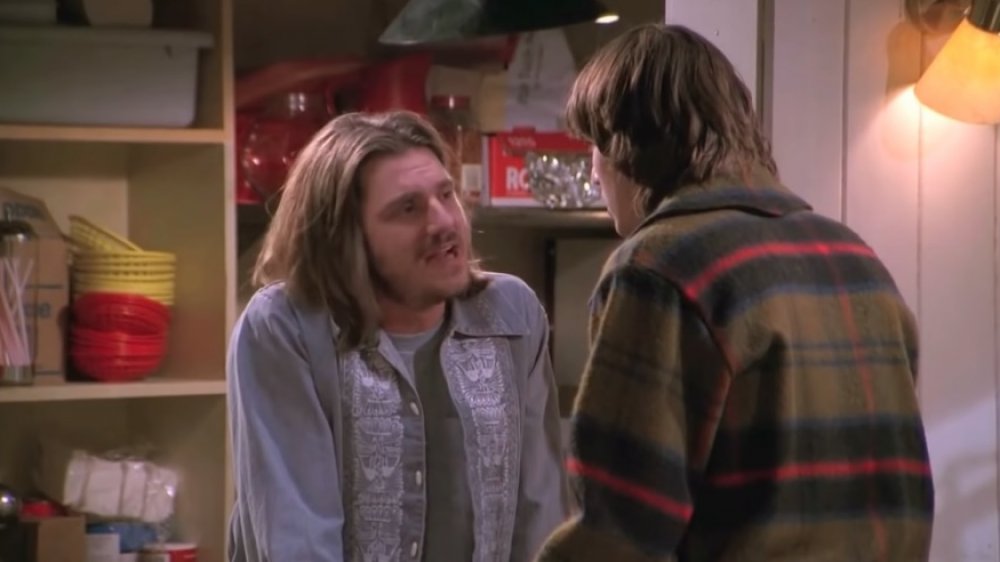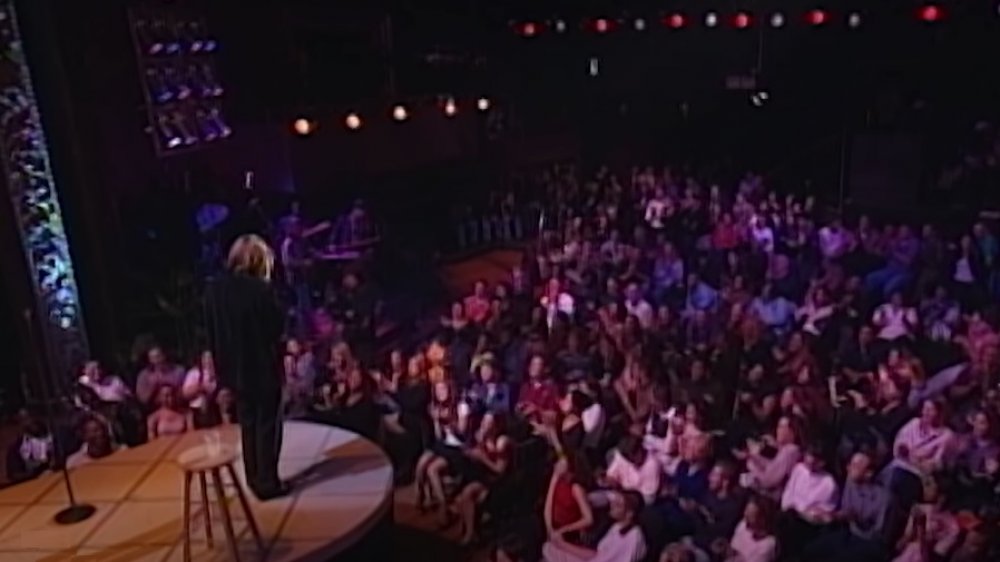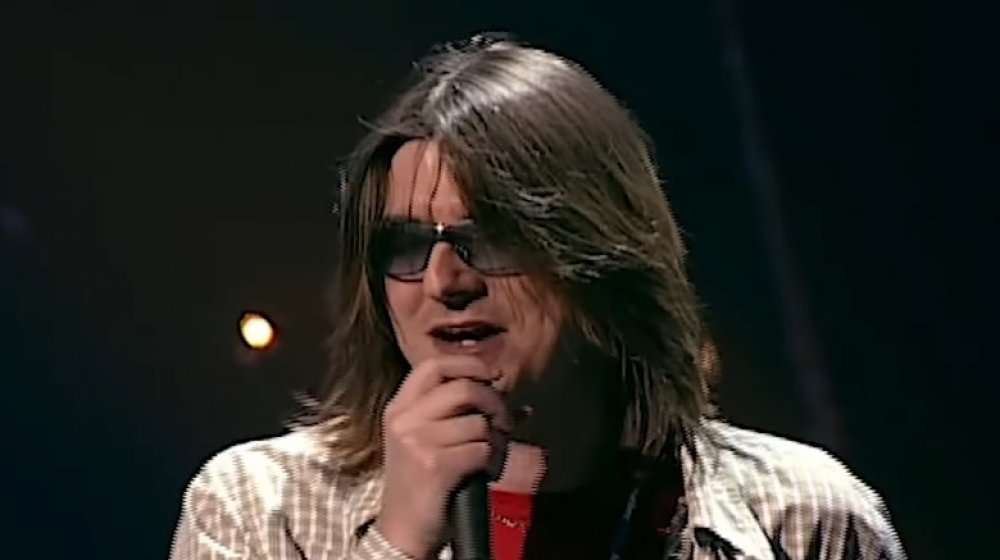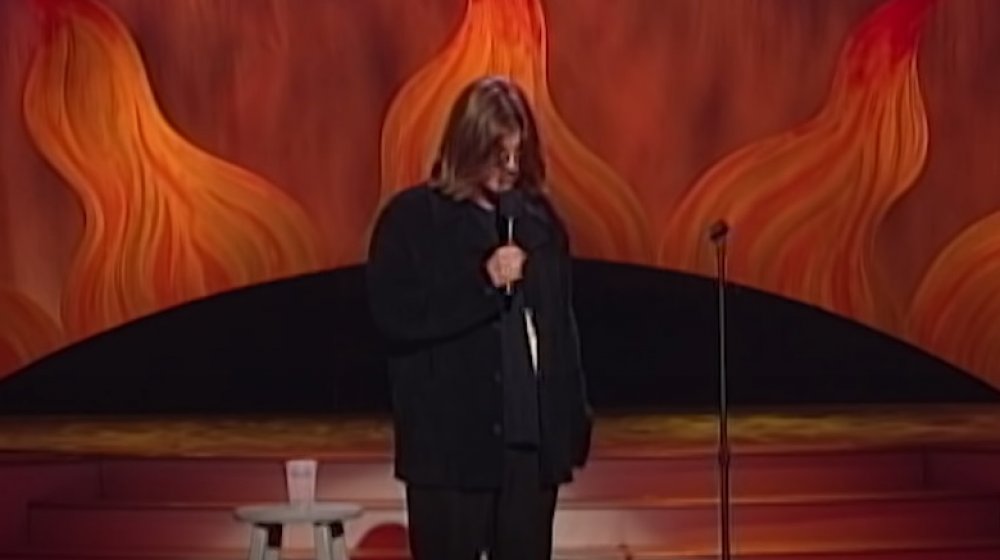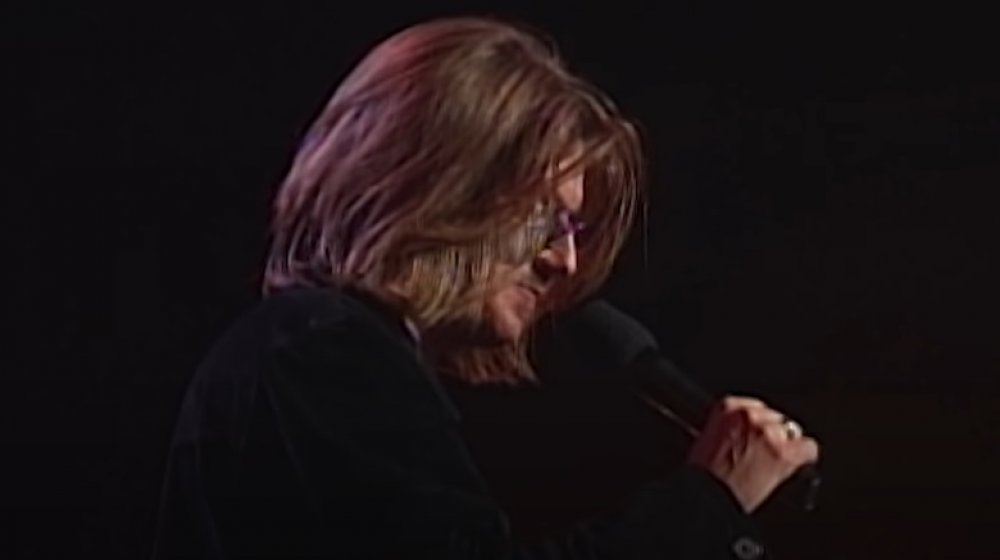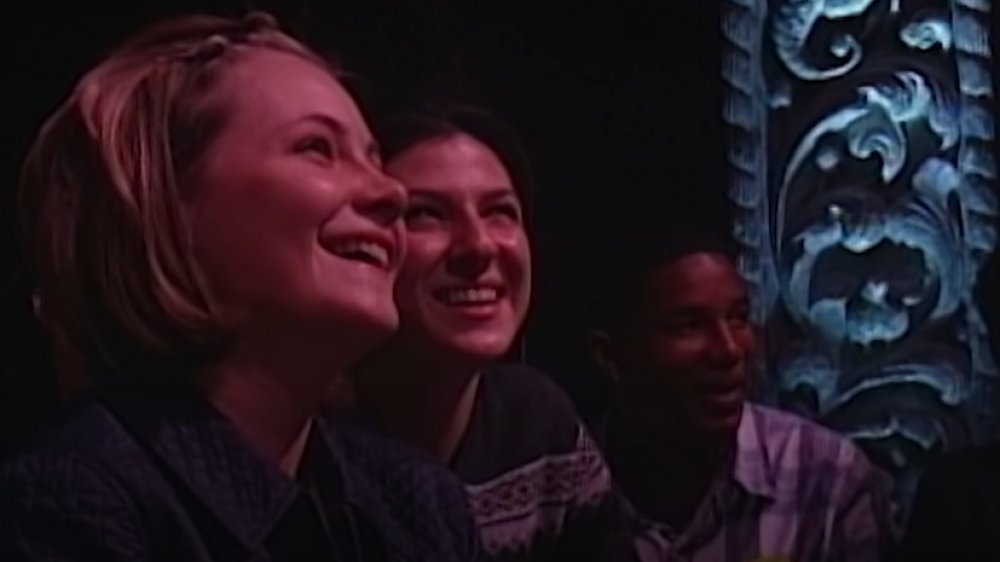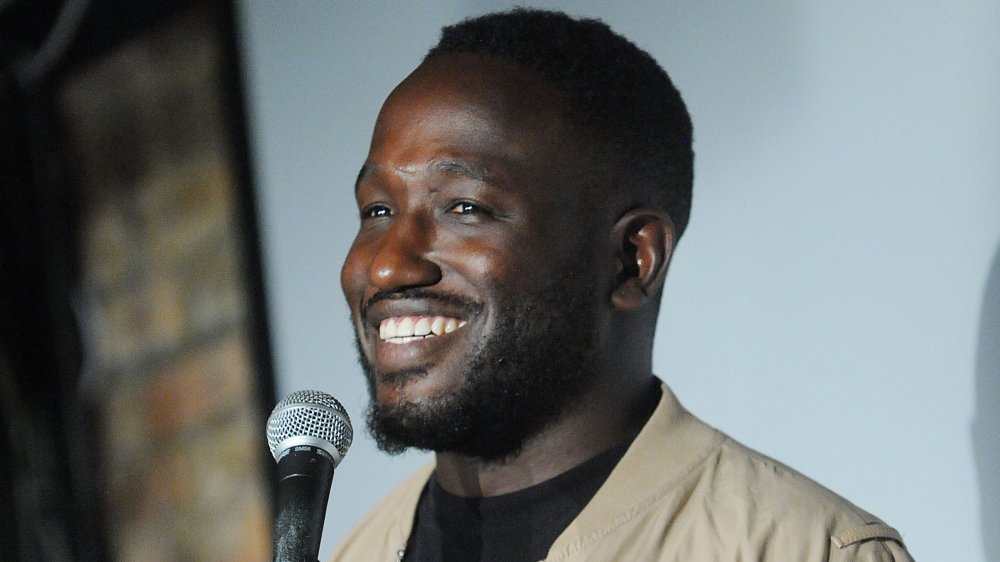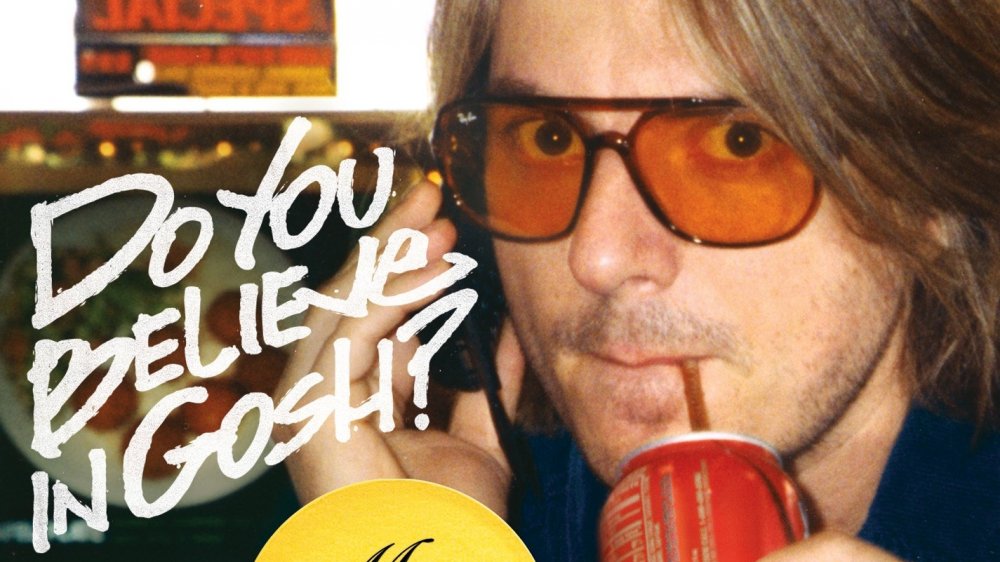The Tragic Real-Life Story Of Mitch Hedberg
We may receive a commission on purchases made from links.
There have been many comedians who've graced the stage and created humor that lasts for ages, and one of those comics is Mitch Hedberg. Many have compared Hedberg to other great comedians such as Steven Wright and Henny Youngman. Mitch Hedberg was also described as an absurdist, observational comedian, stoner comic, slacker comic, one-liner comedian, and a wordsmith. It's very hard to put a label on his style, but it's likely that all of those genres described him in some way. He was able to make people laugh about the silliest of things — but everyone knew there was a true genius behind the construction of each and every musing.
As Hedberg rose in popularity, the comedian appeared on many different stand-up comedy tours, festivals, and television shows, including Just for Laughs, Premium Blend, The Late Show with David Letterman, and Late Night with Conan O'Brien. He also had memorable roles in three movies: Los Enchiladas!, Almost Famous, and Lords of Dogtown. Hedberg also dealt with drug addiction, something that began as a way for the comic to open his mind and have different perspectives but led to his downfall and later his death.
The early days of Mitch Hedberg
Mitch Hedberg was born on February 24, 1968, in St. Paul, Minnesota. Hedberg attended high school in Minnesota before moving to Ft. Lauderdale, Florida, to pursue stand-up comedy. According to the L.A. Times, Hedberg worked as a cook at Applebee's while honing his act. He once joked, "I was born in Minnesota — that's where I was raised. [...] When I was 18, I was kind of sick of living there, so my friend Tim and I — we packed up his car. We moved from Minnesota to Florida. We wanted to move to Texas, but the front-end alignment was bad."
In an interview with The A.V. Club, Hedberg detailed how he first became interested in becoming a stand-up comic. "I knew comics and I loved them and I loved being funny, but I didn't understand the whole concept of becoming one," explained Hedberg. "A friend of mine from another restaurant let me know about these things called open mics. That's all it took. My first couple of times on stage, I was like, 'This is what I'm doing for sure.' I was so excited."
Open mic nights soon became low-paying gigs — Hedberg would often sleep in the back of a pickup while on the road. Eventually, Hedberg moved from Ft. Lauderdale to Seattle, Washington, where he improved his act and gained a larger audience.
Mitch Hedberg's breakthrough in television and radio
As Hedberg developed his act, he would often speak with his eyes closed. The comic would also wear sunglasses while onstage, still with his eyes shut. This would eventually become a trademark of his onstage persona, not to set himself apart but to keep from having to look at the crowd due to stage fright. Along with his look, Hedberg's jokes would continue to evolve, as well.
In an interview with Vice, comedian Marc Maron spoke about the effect Hedberg's comedy had on audiences: "Before he was a star, if [the audience] didn't get on board, he could bomb, but if they did sort of lock in, he could kill. It was sort of fascinating, because he had a sort of taste. That was the way he was going to do it. He wasn't going to go any other way. If the audience didn't get on board, it would be a long half-hour to an hour for them. But if they did, if they got him, he would destroy."
Word of Hedberg began to spread, and a set at a Montreal comedy festival earned him even more praise and led to his first television appearance on The Late Show with David Letterman, as well as spots on Howard Stern's radio show, notes The New York Times. David Letterman loved him for his clever writing and laid-back style, and according to comedian and friend Dave Attell, following Hedberg's first performance, the legendary host wanted him back on the show right away.
Mitch Hedberg's first film and comedy album debut
In 1999, Hedberg's career was full steam ahead. It wasn't long until he decided to put together a film he'd write, direct, and star in called Los Enchiladas! The film was about a dissatisfied Mexican restaurant employee in Minnesota, which draws a couple of parallels to the comic's real life and comedic observations. Hedberg had worked as a cook during his early years as a comic, a job he took to help make ends meet.
He also joked about being asked to take on multiple jobs outside his wheelhouse, saying: "When you're in Hollywood and you're a comedian, everybody wants you to do other things besides comedy. They say 'All right you're a stand-up comedian, can you act? Can you write? Write us a script.' They want me to do things that's related to comedy, but it's not comedy. That's not fair. It's as though if I was a cook, and I worked my a** off to become a good cook, and they said 'All right you're a cook... can you farm?'" (via Buzzfeed).
Los Enchiladas! debuted at the Sundance Film Festival but didn't go over very well with audiences. That same year, Hedberg also released his first comedy album, Strategic Grill Locations, which became a classic. The album featured bass player Chuck Savage, who provided a soundtrack of walking basslines to accompany Hedberg's musings, creating an old-school comedy club vibe.
Mitch Hedberg's move to the mainstream
As Hedberg rose to stardom, Hollywood executives looked for ways to capitalize on his success. Hedberg never joked about serious and divisive topics like politics or religion — he had a very friendly mass appeal which many people thought could translate to a bigger platform outside of comedy clubs. According to Slate, Time Magazine would proclaim Hedberg as "the next Seinfeld." Hedberg secured a $500,000 deal with Fox to create his own sitcom, which would later fall through due to writers not being able translate his persona into a marketable series. Slate's Sam Anderson wrote that the reason it didn't work was because Hedberg's style couldn't be turned into "broad social humor that plays well between commercial breaks. Sitcoms aren't about jokes, they're about zany neighbors who eat too much of your pizza and photogenic dogs who give you meaningful looks."
Even though his sitcom fell through, Hedberg would land a small role on That '70s Show, where he'd make an appearance as Hub chef Frank. Hedberg's brief appearance was a surprise to many of his fans. It may not have been the break he was hoping for, nor one that would fit the hopes of network executives, but it did garner him acclaim and helped him grow his fanbase.
Mitch Hedberg returns to the comedy club circuit
Mitch Hedberg spent less time working comedy clubs while pursuing his other endeavors. When those didn't pan out, the comic returned to the circuit full-time to do what he loved most. As Hedberg toured, he wanted more comedians to join him.
In an interview with Las Vegas Weekly, Hedberg said: "I think some of the country is deprived because someone doesn't want to go to that town, or that town's not cool enough or whatever. So I wish some of these comics that are really good would just get out on the road a bit. [...] Being in Hollywood does help you, it does get you places, it does help your career and all that, you get some spots, but man, I just wish some of these guys would become road dogs more. And we'd have a whole scene of people who are just straight comics only. It was about, 'Hey, what you got coming up, man?' 'Oh, I got Birmingham coming up,' you know what I mean? [Laughs]"
As Hedberg went back to touring, he became more involved with the party lifestyle that accompanied it. Hedberg's wife, comedian Lynn Shawcroft, described his drug use, saying: "Mitch was also attracted to the idea of altering his mind [...] not always looking at things in the same way." One of Hedberg's most notable jokes was about his drug use: "I used to do drugs. I still do, but I used to, too."
Mitch Hedberg's drug use gets worse
As many of us know, it's a very hard process getting someone you love to stop using. Hedberg's family, friends, peers, and fans were all aware of his drug use — the comedian was vocal about using drugs both on- and offstage, but some were unaware of just how far it went. Comedian Mike Birbiglia mentioned Hedberg's drug use, saying: "People always talked about Mitch's drug habit, but I never witnessed it, so I thought maybe it didn't exist, the way a kid puts his hands over his eyes and pretends no one's there."
Hedberg's mother said: "Unfortunately, Mitch, was using drugs more extensively than what we were aware of." Hedberg's wife also detailed how her husband would frequently say he'd get help, saying: "It's not like any attempts weren't made to deal with it but it was always Mitch going, 'Man I swear to God, when we finish this, you know, we'll take care of it.'"
Mitch Hedberg almost loses his leg
It wouldn't be long until Hedberg's drug use would take its toll on his health. According to The New York Times, in 2002, Hedberg was arrested for possession of heroin while at an airport in Austin, Texas. Hedberg was sent to jail but wouldn't stay there for long. While he was being processed, it was discovered that the comic was suffering from a gruesome infection in his leg due to extensive heroin use. Instead of being booked and placed behind bars, he was sent to the hospital.
At first, there wasn't much surgeons could do. They were left with only one option: amputating his leg. However, Hedberg's family decided to go with a second opinion from surgeons from a Houston hospital. It was a long shot, but the medical team said they could save Hedberg's leg by taking muscle from his back and transferring it to his leg. After 13 hours of surgery, Hedberg kept his leg, but unfortunately, his drug use continued.
Mitch Hedberg was particular when defining his style
Like true art, Hedberg's work was left up to interpretation. Hedberg didn't want to be lumped into the wrong category or feel like he was boxed in. Many would cite comics like Henny Youngman and Steven Wright when describing his style — however, Hedberg disagreed.
Hedberg once told A.V. Club: "Actually, when I first read my act described as 'He does one-liners,' I was like 'No, no, I'm so much more than that.' I guess the one-liner kind of comic sounds like a guy who can talk and talk and whatever the subject is, he can pull out a one-liner, but I couldn't do that. I didn't like the association. I mean, I love Steven Wright, but so many people started saying 'Steven Wright' to me, and I would get mad, because I never wanted to be thought of as copying anybody."
Hedberg's wife backed him up, saying: "He's often referred to as a 'one-liner comedian' — and I'll fist fight anyone who says that! To me, Mitch was a wordsmith and he was really silly, which I love. He chose subjects that were timeless. He'd do a joke about bananas or pancakes or cars — things that aren't going away. He didn't do jokes about sex, pop culture or politics, but admired others who did. He searched for an original voice of his own. In this way, Mitch was able to take an audience to a place where our world is looked at in a different, more magical way."
Some of Mitch Hedberg's best moments came when he was at his worst onstage
Mitch Hedberg was great when the audience got him and came along for the ride, but some of his greatest moments were when he was bombing. Comedian Doug Stanhope, who was friends with Hedberg, saw the comedian hit a lot of rough patches, moments he fondly recalls, saying: "Mitch's best shows were when they were falling apart. We did a show in Rochester, Minnesota, where we were co-headlining a one-nighter — we were both very young in our careers [...] it would be probably '93, I guess. It was so bad. There like 11 people in the audience. It sucked so bad. Instead of just one of us going on, and then the next one, we did tag-team headlining [...] it was at its funniest when it was going downhill."
After a joke didn't go over well on his debut album Strategic Grill Locations, Hedberg once said, "All right ... that joke is going to be good because I'm going to take all the words out and add new words. That joke will be fixed."
Journalist and comic Sean L. McCarthy mentioned Hedberg's heavily edited Comedy Central special taping, saying: "The full, uncensored, unedited footage exists and tells a different story. To me, watching Hedberg interact with this Hollywood audience at The Palace for almost 38 minutes for his 22-minute "half-hour" gets closer to the truth, showing us the highs and lows of a Mitch Hedberg performance. Even his insecure moments were fascinating to watch."
Mitch Hedberg's crowds would often yell out the punchlines to his jokes
When Mitch Hedberg was killing, there was an undeniable energy that brought audiences along for the ride. The comic would often have to talk over loud crowds who would ask the comic to retell certain jokes, almost how you'd request a band play your favorite songs. Some would even yell out the punchlines to his jokes before the comic could get to them, which, while flattering, also annoyed Hedberg.
"Didn't you ever hear of dramatic pause?" he'd sometimes say back to impatient audience members. This could cause confusion, as many of his fans always loved reciting his jokes but couldn't understand how it would throw off the comic's timing during his shows. In an interview with The Hollywood Reporter, Lynn Shawcroft said, "People would yell out his jokes at shows. "Mitch would be like, 'I don't want to hear 'aha,' I want to hear 'ha ha!'"
Mitch Hedberg helped up-and-coming comics
Mitch Hedberg was well-known among his peers and friendly with many comics, from comedians fresh off the open mic circuit to veterans. According to Vulture, when Hannibal Buress was first starting out, Hedberg let him and a few other comedians open for him at Zanies in Chicago in 2005.
When Mike Birbiglia was an unknown comic on the rise, Hedberg offered to perform at his CD release party at the Comic Strip in New York City. The generous comic flew himself in, put himself up at a hotel, and refused any money from Birbiglia.
Hedberg mentioned to Las Vegas Weekly that he once ended up angering the man who helped break him into the business due to an act of kindness. During a performance on The Late Show, Hedberg gave a shout-out to one of his comic friends. Hedberg was trying to help his friend gain some exposure, but Letterman took it as the comic trying to dictate who should get booked on his show. Later, Hedberg found out he'd angered Letterman and felt horrible that the host took it the wrong way. However, time heals all wounds — all was forgiven, and the comedian was eventually booked on the show again.
The last days of Mitch Hedberg's life
Hedberg's friend, comedian Chard Hogan, described a very dark conversation they had regarding Hedberg's life, saying: "'You know, Chard, I'm going to be like the Jim Morrison of comedy.' And I laugh. I said, 'Well, what do you mean by that?' He said, 'Well, look at Jim's life, you know. I'd rather die young. I don't want to like just be hanging on forever.'" Unfortunately, Mitch Hedberg lived and died by that same philosophy.
In 2005, Hedberg died from an accidental overdose at the age of 37 in a hotel room in New Jersey. According to Spin Magazine, as reported by New Castle News, the New Jersey medical examiner's office stated that Hedberg died from "multiple drug toxicity," including cocaine and heroin.
For three years after Hedberg's death, fans hoped to hear his last special. It was recorded just two months prior to his passing and featured material fans had never heard. In 2008, Comedy Central Records posthumously released Do You Believe in Gosh?, Hedberg's final comedy album. After dealing with such sadness, thankfully, fans had one more performance from the legendary comic to give them laughs.
